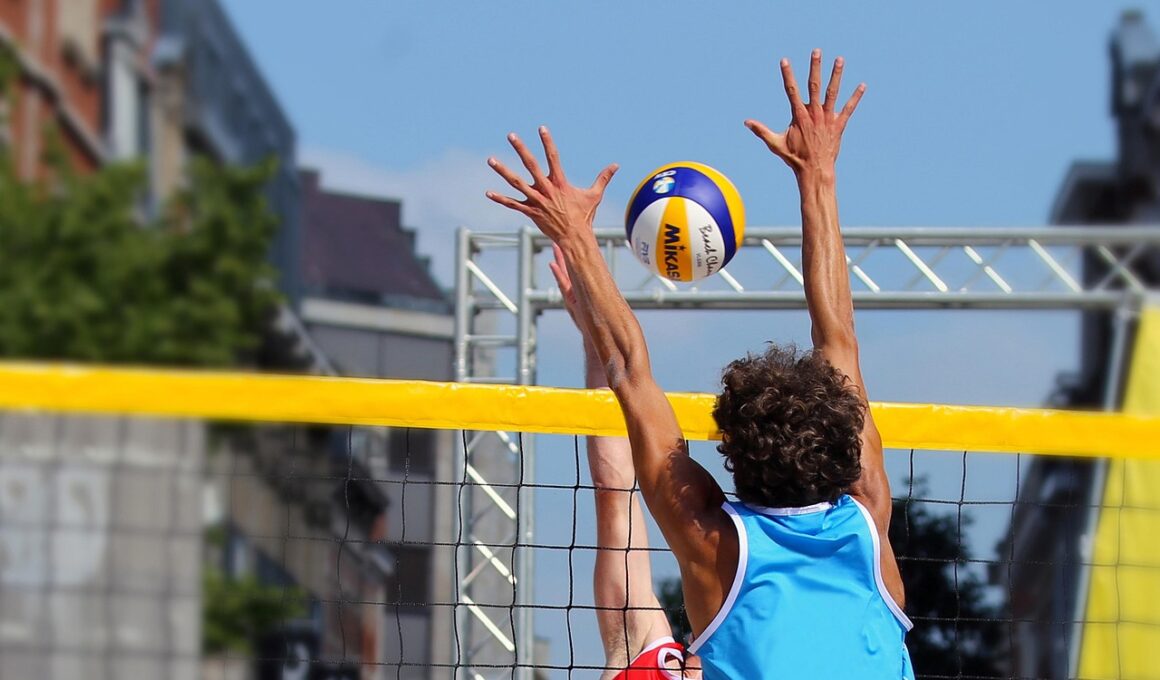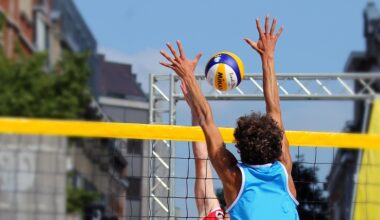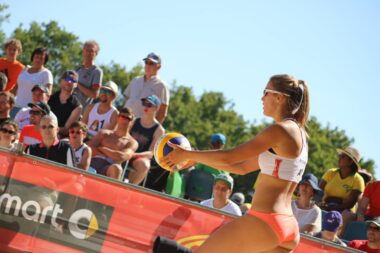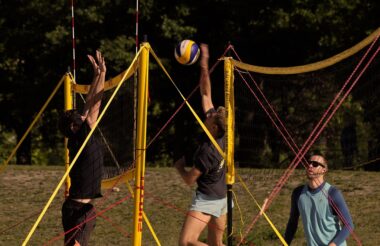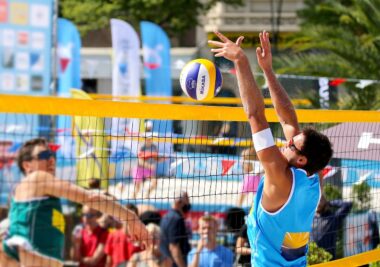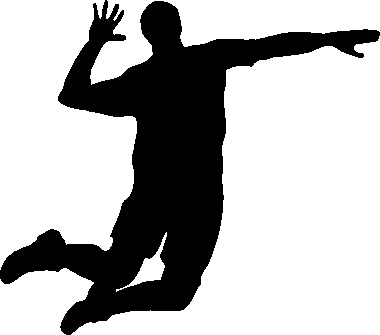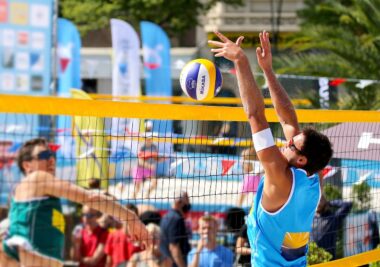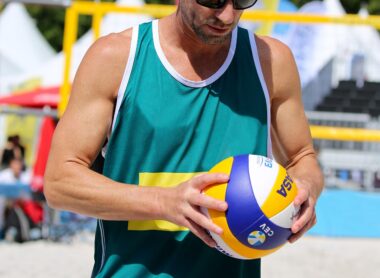How to Read Opponents’ Defense as an Outside Hitter
Reading opponents’ defense is crucial for outside hitters in volleyball. Understanding defensive setups can significantly alter the effectiveness of your attacking options. The primary goal is to analyze the opponents’ formations before each play. Pay attention to how blockers position themselves; they often heighten their stance during critical plays. Watch the spacing between the blockers; a wider gap indicates a possible weakness to exploit. Additionally, assess the libero’s position, as they guide the floor defense. Positioning can reveal which areas might be open for attacks. Communication with setters is vital to ensure the right decisions are made, depending on defensive schemes. For instance, if the defenders pull back, the setter can make adjustments to exploit the vulnerability. Utilize your peripheral vision to identify the movement of defenders, as they can indicate impending plays. By continually evaluating these elements, you can modify your approach and ensure effectiveness. Practice this skill consistently during training sessions with different drills to improve your ability to read defenses. This on-court observation not only helps with strategic decisions but also boosts your confidence in executing plays effectively.
Once you identify weaknesses in the defense, your next step is to effectively communicate this information with your teammates. Clear communication is essential for coordinating attacks, especially when facing a sophisticated defense. Use hand signals or vocal cues to alert your teammates, allowing them to adapt quickly. For example, if you observe a weak back row, signal for a high ball set to capitalize on their unpreparedness. Outside hitters can also study opponents’ pattern tendencies during matches, observing their defensive shifts and adjustments. Noticing these patterns will provide insights into potential weaknesses to exploit further. Moreover, leverage technology by reviewing match footage to analyze how opponents respond during play. Videos can help determine positioning and decision-making processes, enhancing your overall understanding. Discussing footage with your team can highlight collective areas for improvement, including communications effectiveness. Consider organizing regular review sessions to foster a culture of awareness and adaptability during matches. The more informed you are about your opponent’s defensive strategies, the better your chances of executing successful attacks. Therefore, invest time both in communication and analytical efforts. This strategic approach aids your effectiveness as an outside hitter in competitive environments.
Another vital skill for outside hitters is the ability to adapt your playing style based on the defense you face. This adaptability can dramatically enhance your attacking capabilities. For instance, if you notice a defensive team tends to focus on blocking outside hits, consider adjusting your swing technique. Use softer touch shots to manipulate the defense; this can often catch them off guard. Incorporate different types of attacks such as cross-court shots, line shots, or even rolls to places where defenders are not positioned. Flexibility in your approach becomes pivotal as you uncover counter-strategies. Additionally, remember that your approach angle can alter the timing and trajectory of the ball. Changing your attack angle not only affects how the defense prepares but also impacts how difficult your hit is for them to read and react to. Always stay one step ahead by evaluating each play’s effectiveness and flexibility in your decisions. Consistently practicing these adjustments during training will enable you to seamlessly incorporate them during matches. Embrace the requirement of being dynamic in your role. This strategic mindset will elevate your game and improve team collaboration, ultimately leading to increased success on the court.
Understanding Opponents’ Weaknesses
To become a successful outside hitter, it’s essential to develop a keen sense of the opponents’ weaknesses. This entails diligent observation and analysis before and during matches. Start by tracking how the opposing team’s defense responds to your attacks. Identify which corners of the court remain open and consistently exploit them throughout the match. Have your teammates provide feedback to ensure that everyone is on the same page regarding which spots are less guarded. Monitoring the libero’s movement is vital, as they often cover the floor extensively; if they begin to overcommit, this is an opening for you to attack with confidence. Furthermore, by keeping an eye on the block’s height and positioning, you can determine when it’s best to go around or through the block using fakes or carefully placed shots. Don’t hesitate to communicate with fellow hitters regarding these observations, as teaming up can yield significant benefits for the entire offensive strategy. Regularly participating in drills that simulate various defensive setups can enhance your capacity to read defenses seamlessly during matches. Applaud yourself for continual learning and refining these skills; they are essential in rendering you an extraordinary player.
In addition to observing the physical setup of the defense, mental preparation also plays a crucial role in your success as an outside hitter. A strong mental game can help you adjust to any unforeseen defensive strategy. Visualization techniques can help; imagine specific plays and how you will respond to the defensive pressure. Create scenarios in your mind where you execute successful attacks while reading the defenders’ body language. This mental rehearsal enhances your reaction time and solidifies your instincts during matches. Remember, the way you carry yourself on the court matters too. A focused and confident demeanor can intimidate opponents, leading them to make mistakes in their defensive alignment. Build habits of positive self-talk and reflective practices to keep your confidence high. After each match, take time to analyze performances better and adjust mental strategies for future games. Furthermore, embrace the pressure; turning a challenging situation into a learning opportunity will bolster both your physical skills and confidence. Accept that some maneuvers may not work, and that’s perfectly okay. As you cultivate these mental skills alongside your physical training, you’ll start to develop a more resilient and adaptive playing style.
Using Team Strategy to Your Advantage
Finally, leverage your team’s overall strategy to maximize your performance as an outside hitter. Cohesive teamwork can exponentially improve your effectiveness when courting defense patterns. Regular strategy meetings with your team can create pathways for aligning everyone’s gameplay efficiently. Discussing tactics that creatively exploit opponents’ weaknesses is critical. For example, integrating a fake to the middle hitter can draw blockers, allowing you to hit effectively in the open spaces created. Drill these strategies in practice, focusing on precise communication and timing; synchronized movements can frustrate opposing blockers and defenders alike. Encourage setters to vary their sets based on your observations of the defense, as this can keep them guessing. Furthermore, analyzing past matches where team strategies led to significant points can fine-tune defense reading. Keeping an open dialogue with your teammates about successes and shortcomings reinforces a collective mindset on court adaptability. Furthermore, engage in team challenges to propel your offensive efforts collectively. Ultimately, teamwork and strategy are just as crucial as individual skills in maximizing your success as an outside hitter. Embrace these cooperative elements fully and enjoy the process of playing together towards a mutual goal during matches.
In conclusion, reading opponents’ defense is a vital skill that every outside hitter should develop. By combining observational skills with effective communication, adaptability, and a sound mental approach, you can significantly impact the game. Take time to analyze opposing players’ formations, spot weaknesses in defense, and adjust your attacking tactics accordingly. Practice continually in various training environments to ensure that your abilities to read defenses are sharp and reliable. Engage in discussions with teammates about defensive strategies, fostering a shared methodology that would enhance team performance. Also, utilize visualization strategies to mentally prepare yourself for demanding situations that arise in matches. Establishing team-oriented strategies ensures a cohesive response that can confuse the opposition. The blend of individual aptitude and teamwork cannot be overstated; your ability will blossom as you nurture both skills. With dedicated practice, clear communication, and a focus on adaptive strategies, you will become a formidable force as an outside hitter. As you progress, remember that reading defense is a dynamic skill that evolves. Embrace the journey of growth at each stage, and relish every opportunity to put your training into action during a game.
Reading opponents’ defense is crucial for outside hitters in volleyball. Understanding defensive setups can significantly alter the effectiveness of your attacking options. The primary goal is to analyze the opponents’ formations before each play. Pay attention to how blockers position themselves; they often heighten their stance during critical plays. Watch the spacing between the blockers; a wider gap indicates a possible weakness to exploit. Additionally, assess the libero’s position, as they guide the floor defense. Positioning can reveal which areas might be open for attacks. Communication with setters is vital to ensure the right decisions are made, depending on defensive schemes. For instance, if the defenders pull back, the setter can make adjustments to exploit the vulnerability. Utilize your peripheral vision to identify the movement of defenders, as they can indicate impending plays. By continually evaluating these elements, you can modify your approach and ensure effectiveness. Practice this skill consistently during training sessions with different drills to improve your ability to read defenses. This on-court observation not only helps with strategic decisions but also boosts your confidence in executing plays effectively.
